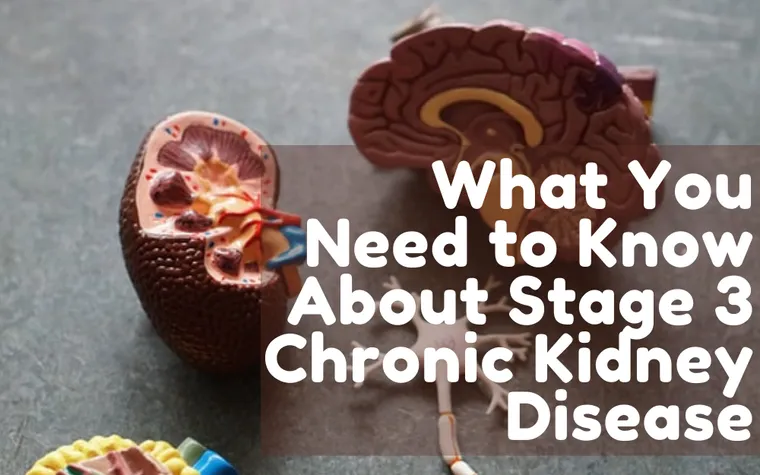Stage 3 Chronic Kidney Disease (CKD) is a moderate stage of kidney damage where the kidneys function at 30–59% of normal capacity. At this stage, waste begins to build up in the body, but symptoms may still be mild or unnoticed. Early detection and consistent medical care are essential to slow progression. Patients may begin to experience fatigue, swelling, and changes in urination patterns. With proper lifestyle changes, medication, and monitoring, many people with Stage 3 CKD can maintain a good quality of life and prevent progression to more severe kidney dysfunction or failure.
Managing Stage 3 CKD involves close collaboration with healthcare providers to monitor kidney function through regular blood and urine tests. Diet plays a crucial role—reducing sodium, potassium, and phosphorus intake helps limit strain on the kidneys. Blood pressure and blood sugar control are also key in slowing progression, especially for patients with diabetes or hypertension. Quitting smoking, maintaining a healthy weight, and staying active all contribute to better kidney health. Understanding treatment options and taking proactive steps empowers patients to protect their remaining kidney function and improve long-term outcomes, reducing the risk of complications or end-stage kidney disease.
What Is Stage 3 Chronic Kidney Disease?
Stage 3 CKD is typically divided into two sub-stages:
- Stage 3a: GFR (glomerular filtration rate) between 45–59
- Stage 3b: GFR between 30–44
At this point, the kidneys are moderately damaged but still functioning. While symptoms may still be subtle, laboratory tests will show reduced kidney efficiency, prompting more focused medical care.
Common Symptoms of Stage 3 CKD
- Fatigue and decreased energy
- Fluid retention, swelling in hands and feet
- Changes in urination (more frequent or less)
- Muscle cramps, especially at night
- Sleep issues
- Mild anemia
- Elevated blood pressure
Not everyone with Stage 3 CKD will experience all of these symptoms. Some people may feel perfectly fine but still require treatment to manage their condition effectively.
Causes and Risk Factors
Stage 3 CKD can result from various underlying conditions:
- Diabetes (leading cause)
- High blood pressure
- Polycystic kidney disease
- Autoimmune diseases like lupus
- Frequent kidney infections or obstructions
Diagnosis and Monitoring
Doctors diagnose CKD using blood tests to measure creatinine levels and calculate GFR, along with urine tests for protein or blood. Regular follow-ups help monitor disease progression, manage complications, and adjust treatments as needed.
Treatment and Lifestyle Changes
While Stage 3 CKD cannot be reversed, it can be managed. Treatment includes:
- Medications to control blood pressure (ACE inhibitors/ARBs), diabetes, and cholesterol.
- Dietary adjustments: Reduce salt, protein, phosphorus, and potassium intake.
- Exercise: At least 30 minutes of moderate activity most days.
- Quit smoking: Smoking accelerates kidney damage.
A referral to a nephrologist is often recommended at this stage for specialized care.
Potential Complications
Stage 3 CKD increases the risk of:
- Heart disease
- Bone disease due to altered calcium/phosphorus balance
- Anemia
- Electrolyte imbalances
- High blood pressure
Managing these risks early is essential to prevent further health problems.
Here are some of the best drinks for kidney health:
- Water – Essential for hydration and toxin elimination.
- Cranberry Juice – Supports urinary tract health and kidney function.
- Lemon Water – Helps prevent kidney stones and provides antioxidants.
- Beetroot Juice – Detoxifies the kidneys and improves function.
- Green Tea – Reduces inflammation and supports kidney health.
- Apple Cider Vinegar – Helps break down toxins and balances pH.
- Ginger Tea – Reduces kidney inflammation and promotes healthy function.
Natural remedies:
Staying hydrated, using herbs like ginger and turmeric, and incorporating a kidney-friendly diet with low sodium and protein. Always consult a healthcare professional before trying new treatments.
Outlook and Long-Term Management
With early intervention and the right care, many people with Stage 3 CKD live full, active lives. Slowing progression to Stage 4 or 5 (end-stage kidney disease) is the primary goal. Regular checkups, healthy lifestyle choices, and medication adherence are vital for maintaining kidney function and overall well-being.
Conclusion
Stage 3 Chronic Kidney Disease is a critical phase where awareness and proactive care can make a major difference. While kidney function is compromised, proper management can help maintain stability and improve quality of life. Education, lifestyle changes, and consistent medical support are the keys to living well with CKD.

